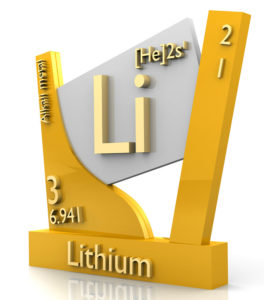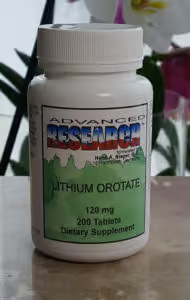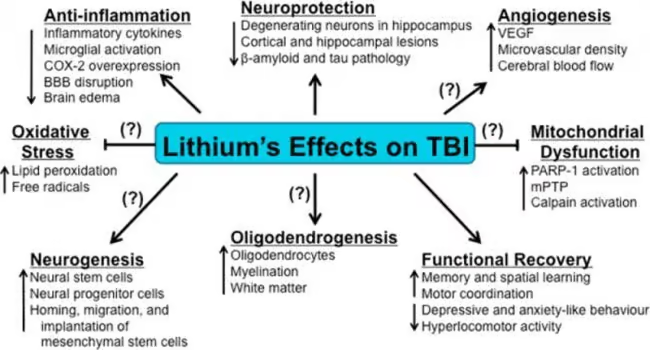Table of Contents
Key Takeaways
- Lithium is a natural alkali metal essential for reproductive health and overall wellness in humans and animals.
- Historically used for therapeutic purposes, lithium is studied for its neuroprotective and mood-stabilizing effects.
- Micro-dosing lithium through supplements like Lithium Orotate offers cognitive benefits such as mood balancing, promoting growth factors and neurogenesis, and brain protection.
- Adequate lithium intake from diet and water may help prevent mental and neurological diseases, while low levels can be associated with depression, anxiety, and memory decline.
- Lithium Orotate is a popular micro-dosing option that provides mood stabilization, neuroprotection, and cognitive enhancement without toxic side effects of higher doses.
Lithium is a soft, silvery-white alkali metal so reactive (it sparks when it touches water) that it’s not found in nature on its own. Instead, it’s found in mineral compounds and in mineral water.
Cosmologists believe that lithium was one of the 3 elements synthesized in the Big Bang.[i] So it’s been around for a long time.
Most of us associate prescription lithium with treating mental illnesses like bipolar disorder and mania (lithium carbonate). Or the lithium-ion battery in our phone. Which has a tendency to blow up occasionally.
Turns out that the anti-psychotic medication lithium isn’t even a drug. It’s actually a naturally occurring mineral. Lithium salts are part of the same family of minerals that include potassium and sodium.
As a nootropic, micro-dosing lithium provides some amazing anti-aging benefits. Recent research shows that low-dose lithium may also help slow the progression of neurodegenerative diseases like Alzheimer’s, dementia and Parkinson’s disease.
Low-dose lithium also helps neurogenesis and memory. And is a mood stabilizer.
Here we’ll investigate daily or frequent use of Lithium Orotate as a nootropic, and how it benefits cognitive health.
Lithium helps:
- Balance mood. Lithium calms mania (extreme highs and lows) by decreasing sensitivity of the post-synaptic norepinephrine receptor.[ii] And increases uptake of norepinephrine into synaptosomes. Preventing the release of this neurotransmitter. And lithium enhances the transport of Vitamin B12 and folate into brain cells.[iii] Affecting mood and aggression.
- Growth Factors. Lithium upregulates brain-derived neurotrophic factor (BDNF), nerve growth factor (NGF), neurotrophin-3 (NT3) and their receptors. And lithium stimulates the proliferation of stem cells in the brain. All boosting neurogenesis and assisting in repair from all types of brain injury.[iv]
- Neuroprotection. Lithium increases brain gray matter, increases DNA replication for neurogenesis, prevents apoptosis, increases N-acetyl-aspartate (NAA), inhibits beta-amyloid secretion and protects against damage once it’s formed, chelates aluminum, and protects against glutamate toxicity.
Overview
Lithium is an alkali mineral and one the trace elements considered essential for both animal and human reproductive health, and general health and wellness.
Discovered as a chemical element in 1817, lithium’s first recorded modern medical use was in 1871 for the treatment of mania.
But the use of lithium for therapeutic use goes back to ancient Greek and Roman times. People enjoyed soaking in alkali springs to help with physical and mental illness.
People have been using mineral springs for therapeutic use ever since. Lithia Springs in Douglas County, Georgia was so popular that people came for miles just to drink the water.
The Sweet Water hotel, a luxury 500-room resort was opened in 1887. And attracted famous authors, business people and prominent politicians who came for the spring’s health benefits. The name “Lithia” stems from water rich in lithium.
Studies from around the world have shown the critical health benefits of lithium. One study using data from 27 Texas counties from 1978 – 1987 found that rates of suicide, homicide and rape were significantly higher in counties whose drinking water contained little or no lithium.[v]
Another study of lithium levels in tap water in 18 municipalities in Japan showed standard mortality ratios lower in places with higher lithium levels.[vi]
Yet another study conducted in Texas in 2013 confirmed the original findings in that state. Drinking water samples from 226 counties found a correlation between lithium levels and suicide rates.[vii]
Researchers who conducted meta-analyses of lithium levels and public drinking water suggested “increasing lithium levels of drinking water could potentially reduce the risk of suicide, and justify administering lithium to tap water.”[viii]
An article in the Lancet in 1949 by John Cade is credited for the modern medical use of lithium as an effective treatment for manic psychosis.[ix]
The United States FDA approved high dose lithium carbonate and lithium citrate in 1970 for the treatment of bipolar disorder. Carbonic acid and citric acid are mineral carriers used to transport lithium throughout your body.
Doctors also prescribe lithium off-label for treating migraines, seizure disorders and psychosis usually after other treatments have failed.
But as we dig deeper into the most recently published research on lithium, we realize this trace element is essential for optimal health and brain function.
The lithium we get from our diet prevents many neurological and psychiatric problems. Micro-dosing lithium as a nootropic with a supplement like Lithium Orotate can help make up for the what we don’t get from our food and water.
Lithium is naturally available from fish, processed meat, milk, dairy products, eggs, potatoes and vegetables. Your typical dietary intake of lithium can range from 2 – 600 mcg. Amounts vary depending on where the food is grown.
How does Lithium work in the brain?
Lithium helps brain health and function in several ways. But two in particular stand out.
- Lithium stabilizes mood. Recent research has discovered that lithium’s mood stabilization effects may be due to its ability to boost the production of new brain cells (neurogenesis).
Lithium inhibits the enzyme glycogen synthase kinase-3β (GSK-3β). This inhibition upregulates brain-derived neurotrophic factor (BDNF), and insulin-like growth factor-1 (IGF-1) which stimulates neural stem cells to produce new neurons in the hippocampus.[x]
When neural stem cells produce new neurons in the hippocampus, mood and memory work as designed. But a breakdown in neurogenesis results in mood disorders.
Lithium has long been known to control mania and stabilize mood in bipolar patients. But it was not generally thought of as an antidepressant. Researchers in Tel Aviv provided the first evidence that inhibiting GSK-3β exerted a rapid antidepressant effect in mice.[xi]
Another team at Howard Hughes Medical Institute in Pennsylvania showed that feeding mice chow laced with low-dose lithium for 15 days produced a dose-dependent antidepressant effect.[xii]
Lithium induced gene transcription in the hippocampus, amygdala and hypothalamus. All areas implicated in depression, anxiety, bipolar disorder, autism and schizophrenia.
- Lithium protects your brain. Your brain cells are at constant risk of damage from exposure to toxins you encounter every day from food, air, water and your environment. And the excitotoxins produced by ordinary brain cell metabolism.
Glutamate plays a major role in the synaptic plasticity needed for learning and memory.[xiii] But over-activity of glutamate on its NMDA receptors causes neuron death and is implicated in Alzheimer’s, Huntington’s and Parkinson’s disease. Lithium inhibits this overactivity.[xiv]
Lithium also increases the production of a neuroprotective protein called bcl-2.[xv] Researchers maintain that lithium is the only “medication” that has been demonstrated to significantly increase bcl-2 in several brain areas.
Lithium has also recently been evaluated in preventing and treating traumatic brain injury. In a study conducted in 2014, Dr. Peter Leeds stated that lithium had “demonstrated robust beneficial effects in experimental models of Traumatic Brain Injury (TBI). These include decreases in TBI-induced brain lesion, suppression of neuroinflammation, protection against blood-brain barrier disruption, normalization of behavioral deficits, and improvement of learning and memory, among others.”[xvi]
How things go bad
In 1985, the United States EPA estimated that dietary intake of lithium from food in the USA varied from 0.6 to 3.1 mg per day.[xvii] For comparison, people who live in the Andes in Northern Argentina consume 2 to 30 mg per day, with 2 – 3 mg just from drinking water.[xviii]
As your dietary sodium and caffeine increases, so does lithium excretion in urine which increases your requirement for this essential trace mineral.
Your exposure to stress and toxins from things like mercury, aspartame, MSG, Bisphenol A (BPA) and other excitotoxins also raise cortisol and other stress hormones. Increasing your need for more water-soluble nutrients like B-vitamins, magnesium, zinc and lithium.
Low lithium levels are associated with …
↑ Depression and anxiety increase
↓ Memory and learning ability decline
↑ Insomnia increases
↑ Sensitivity to stress and chronic pain increase
↓ Natural healing processes decline
Adequate daily intake of lithium could help prevent many mental and neurological diseases due to this trace minerals effects on nervous system metabolism. And it’s anti-inflammatory and antioxidant effects.
Lithium Orotate benefits
The clinical research and studies on the neuroprotective benefits of lithium are so overwhelming, some scientists are beginning to ask “why isn’t everyone using lithium”?
Here’s a summary of how micro-dosing lithium using Lithium Orotate can benefit your brain.
- Inhibits apoptosis – lithium inhibits GSK-3 which has been linked to apoptotic cell death
- NMDA-receptors – lithium reduces glutamate induced toxicity mediated by NMDA-receptors which helps in mood disorders, Alzheimer’s, and other autoimmune and inflammatory diseases
- Neuroprotection – blocks the development of beta-amyloid tangles and plaque
- Neurogenesis – lithium promotes the increase of brain-derived neurotrophic factor (BDNF) needed for synaptic plasticity in learning and memory. Lithium also boosts nerve growth factor and glial-derived neurotrophic factor affecting learning, memory, mood and overall brain health[xix]
- Neuronal stem cells – lithium stimulates the stem cells needed to produce new neurons (neurogenesis)
- Stabilizes mood – lithium is known for providing a calming effect in healthy people as well as those dealing with depression, bipolar disorder, and mania
- Suicide prevention – adequate levels of lithium has been shown to reduce suicide risk in multiple studies worldwide
- Depression – lithium helps with treatment-resistant depression. In fact, lithium has been shown to improve the effectiveness of antidepressant medications
- N-acetyl aspartate (NAA) – lithium increases NAA which has been associated with higher IQ scores[xx] (i.e. lithium will make you smarter!)
The benefits of supplementing with lithium go far beyond just optimizing cognitive health. Lithium also helps decrease insulin resistance, helps in treatment of alcoholism and other addictions, supports bone health, balances your circadian rhythm and more.
How does Lithium Orotate feel?
My personal experience with Lithium Orotate has made me a believer in micro-dosing lithium. I’m Adult ADD and deal with mood swings from time to time.
If I’m going around the bend because something upset me, I take 5 mg of Lithium Orotate. Within 15 minutes my mood stabilizes and I feel normal again. Consistent use puts me in a happy mood.
Many others report you’ll feel the results taking a low dose of lithium quickly. But for some, the full effect can take anywhere from 1 to 3 weeks. Micro-dosing 5 – 10 mg of lithium daily results in consistent results within a month or two for some. I’ve experienced great results within a couple of days.
So if you lash out at people in anger, and don’t fully understand why you get so angry – it could be your lithium levels are low.
Many neurohackers with depression and anger issues notice results quickly. Within the first couple of days you should feel more calm, relaxed, and experience less stress.
Keep in mind that lithium at any dose is not for everyone. But if you get adequate lithium from your diet and water, and still experience some of the mood swings talked about in this review, you could be dealing with other issues. You should know within a couple of hours of supplementing with low-dose lithium if this supplement is for you.
For some, Lithium Orotate means feeling excited about life for the first time in a long time. Anxiety and social anxiety are no longer a problem. Life is more fun and enjoyable.
Some say Lithium Orotate works better than any prescription that they’ve ever tried to treat severe depression. It provides a nice, smooth mood balance without all the toxicity associated with mega-doses of lithium carbonate.
If you’re dealing with PTSD or mild insomnia, you may want to try Lithium Orotate. Focus could improve, racing thoughts diminish and motivation levels could increase. You’ll have more coping ability.
Lithium Orotate Clinical Research
Lithium Improves Memory
A study at McMaster University in Canada set out to determine the effects on hippocampus volume in 14 bipolar patients who received lithium therapy.
The researchers examined the effects of lithium on hippocampal volumes and memory performance and recall over 2 – 4 years. The patients had not received any type of medication prior to using lithium.
The study found increases in hippocampus volume over time. And evidence of improvement of verbal memory performance over the 4-year measurement period.
The researchers concluded that the results of the study were consistent with the literature stating the neuroprotective effects of lithium. And that long-term lithium treatment is associated with preservation of memory and recall due to increased hippocampus size.[xxi]
Lithium Increases Mood in Recovering Addicts
24 adults recovering from heroin or methamphetamine addiction participated in a study in San Diego. Group A received 400 mcg per day of lithium taken orally for 4 weeks. The placebo Group B naturally took a non-active placebo.
Subjects completed a mood test questionnaire containing questions about their ability to think, work, mood and emotions. For the lithium group, mood test scores increased steadily and significantly during the 4 week period.
The lithium group also reported significantly increased levels of happiness, friendliness and energy. Group B showed no improvement during the same period.
The researchers concluded that low-dose lithium provided a mood-improving and stabilizing effect.[xxii]
Lithium Orotate in the Treatment of Alcoholism
In this study, 42 alcoholic patients were treated with Lithium Orotate during alcohol rehabilitation in a private clinical setting for six months. The data was collected from clinical practice records for the 10 years following the initial study.
The patients received 150 mg of Lithium Orotate daily for six months along with calcium orotate, magnesium orotate, bromelain and essential phospholipids.
Ten of the patients had no relapse from 3 – 10 years. 13 patients stayed sober from 1 – 3 years. The remaining patients relapsed between 6 – 12 months.
The researchers concluded that Lithium Orotate therapy was safe in treating addiction with minor adverse side effects.[xxiii]
Lithium Orotate Recommended Dosage
Lithium retains a grim and undeserved reputation. Likely because it was originally associated with serious mental illness. And like most medications, lithium can produce serious side effects if not monitored properly.
Lithium carbonate or lithium chloride salts are typically prescribed for long-term control and to treat bipolar disorder at 900 – 1200 mg per day. The major problem with such high doses of lithium are some very serious and debilitating side effects.
For nootropic use, I suggest Lithium Orotate which typically contains only 5 mg of elemental lithium. Lithium Orotate is orotic acid combined with lithium.
Orotic acid reportedly makes the lithium more bioavailable than lithium carbonate. The lithium is released once it crosses the blood-brain barrier. So you’ll get the benefits of lithium supplementation while avoiding the toxic side effects of high doses.[xxiv]
Lithium Orotate supplements recommended dose is 5 mg two or three times per day. See “Where to buy Lithium Orotate” for more on lithium amounts in nootropic supplements.
Many neurohackers use Lithium Orotate only as needed. For example, when feeling anxious or in the middle of a mood swing.
For someone with bipolar disorder or manic disorders, increasing to two 5 mg tablets up to 3-times per day may be more effective.
Naturopathic doctors suggest stacking 1,000 mg of Omega-3 and 400 UI of Vitamin E (as mixed tocopherols) each day you’re using Lithium Orotate.
Lithium Orotate Side Effects
Do not confuse Lithium Orotate with lithium carbonate. The carbonate version of lithium is only available by prescription and comes with a host of side effects.
Prescription lithium used in excess has been shown to have adverse effects on thyroid and kidney function. This is NOT a problem when supplementing with Lithium Orotate when used at recommended dosages.
Lithium Orotate at low doses is non-toxic and lab tests are not required to monitor your lithium levels because it does not show up in blood samples.
Lithium Orotate should not be used if you are dealing with significant renal or cardiovascular disease, severe dehydration or sodium depletion, or if you’re taking diuretics or ACE inhibitors.
Do not use Lithium Orotate if you are pregnant or breast-feeding.
You should check with your doctor if you are on any medication before using Lithium Orotate.
Where to Buy Lithium Orotate
Mother Nature has already put the antipsychotic “drug” lithium in drinking water. And you get some lithium from food depending on where it’s grown.
Supplemental Lithium Orotate typically comes in 120 or 130 mg capsules or tablets containing 5 mg of elemental lithium.
I recommend and use Advanced Research Lithium Orotate which was formulated by Dr. Hans Nieper.
Nootropics Expert Recommendation
 Lithium Orotate 5 mg 2 or 3 times per day.
Lithium Orotate 5 mg 2 or 3 times per day.
I recommend using Lithium Orotate as a nootropic supplement if you’re feeling anxious or depressed. Or experiencing mood swings.
Your body does not make lithium on its own. So you must get this essential trace mineral from your diet, or a supplement like Lithium Orotate.
Lithium combined with orotic acid makes Lithium Orotate which readily crosses the blood-brain barrier, and you should feel its effects within 15 – 20 minutes of taking it.
Lithium Orotate is especially effective if you’re feeling stressed, or mentally overworked. Your brain uses lithium faster and it needs to be replaced. Which you can do by using Lithium Orotate.
Lithium Orotate is great if you are ADHD because lithium calms the hyperactivity in your brain.
Lithium supplements do not change your state of consciousness. It simply helps bring you back to feeling normal and happy.
I suggest trying Lithium Orotate as a nootropic supplement with your first dose at 5 mg and see how you react. If you experience no negative reaction, try another 5 mg in a few hours. Up to 3 – 5 mg doses per day.
You’ll likely experience the full benefits of Lithium Orotate within a week of consistent use.










Join The Discussion - 874 comments
Kris
February 15, 2021
I suffer from ADHD and depression currently. Would a stack of Lithium Orotate (serotonin) and L-Dopa (dopamine) be a good stack?
David Tomen
February 16, 2021
Kris, negative. It would not be a good stack. First, L-DOPA is a first choice only when you have a severe dopamine problem. Like Parkinson’s. Or a LOT of experience using nootropics. Depending on the extract, it can be very potent and too hard to dose. L-Tyrosine is easier and safer to use for boosting dopamine.
For ADHD, please see my article here for the full protocol on handling your symptoms: https://nootropicsexpert.com/best-nootropics-for-adhd-add/
For depression you first have to determine the cause. And unless you have had some success with a prescription antidepressant, it will take some experimenting until you figure out why you have depression. It could be a “side effect” of ADHD. Or if it’s cause is something else, this article may help you find the cause: https://nootropicsexpert.com/best-nootropics-for-depression/
Lithium Orotate is often used “as needed” for fits of rage. Or frequent bouts of severe irritability. Otherwise, it can be used if you are lithium deficient (many of use are). Or just to try it and see if it helps. It’s not a ‘first line of defense’ for depression for most people.
Kristie
February 27, 2021
I have a constant fear of people and places I have lost my desire to live most days because I have shut myself off from the world. I stay alone all the time because of it which causes depression and anger. Will this help me? I ordered it and it arrives tomorrow. Will it help with the anxiety and how much should I take?
David Tomen
February 27, 2021
Kristi, the recommended dosage for Lithium Orotate is 5 mg. Your can safely double that if you need to. And use it up to 3-times per day.
There is no way to tell if it will help you until you try it. But it’s not known for “fear”.
One of my favorite nootropics is Aniracetam (https://nootropicsexpert.com/aniracetam/) because it’s one of the best antidepressants I’ve ever used. Studies show that Aniracetam can reduce anxiety, depression and fear. And increase sociability.
Ajumi
February 13, 2021
Hi David,
Can you say something about Lithium Gluconate?
Is it toxic, good as L. Orotate ecc…?
David Tomen
February 15, 2021
Ajumi, as far as I can tell Lithium Gluconate is used to treat a form of dermatitis. It is definitely NOT the same as Lithium Orotate.
There are a number of different lithium salts some of which are used for various health issues. But Lithium Orotate stands on its own as a way of micro-dosing lithium for its nootropic effects.
Rose
February 12, 2021
Hi David, I have a friend I am trying to help. She has been diagnosed with severe depression for many years. She is 71 and taking 750mg a day of Lithium Carbonate and 200 seroquel in the evenings. It is not really helping her, nor has it ever. If I could get her to take it, how or would you recommend supplementing with it? Do you think it could help her?
thank you,
Rose
David Tomen
February 12, 2021
Rose, if your friend is already using Lithium Carbonate it’s unlikely that Lithium Orotate will help her. Because people who used to use high dose lithium switch to Lithium Orotate because it’s a much lower dose and works for some just as well.
It sounds like Lithium and Seroquel don’t work for her. And Seroquel affects ALL the major neurotransmitters in your brain. So maybe dysfunctional neurotransmitters (i.e. serotonin and dopamine) are not her problem. It could be her depression is caused by something else.
I suggest you read this article for more: https://nootropicsexpert.com/best-nootropics-for-depression/
Ethan
February 9, 2021
Hi David,
I have a couple questions we will start with the ridiculous and then move right into the reasonable.
1. Google has allot of “lithium orotate causes hair loss.” Call it vanity but i enjoy my hair lol. I have been taking 5mg off and on for a year. It has been incredibly beneficial to my ADD and it helped me quit smoking. As I had severe mood swings that often stopped me from making it the three days that it takes for nicotine to leave your blood. (Spare my family) Sometimes i take it everyday if I’m particularly stressed or even to optimize social anxiety like a first date scenario or job interview. Although my social anxiety is quite mild I prefer to appear calm, cool and collected which is exactly what I have experienced. I’m assuming this is bull or that at 5mg on average 3 times a week would do nothing. Big pharma I imagine would spend good money to detour people from such a cheap solution.
2. Much more importantly does lithium restrict dopamine in anyway? I’m asking because I’m going to start stacking it with L tyrosine and theacrine. I’m fine with experimenting as I usually do but I’d like to hear your opinions.
3. Bonus vanity question best supplements for hair? Lol
David Tomen
February 9, 2021
Ethan,
1. bullsh*t – they have no idea what they’re talking about
2. if anything lithium will support dopamine
3. Rosemary oil diluted with something light like MCT Oil massaged into your scalp every night
Noah Baskin
February 13, 2021
David,
I was wondering if you could comment on my current nootropic stack. I’m sure everything is safe and fine, from the research I’ve done, but I want to be certain. Im taking:
Lithium orotate: 5mg 2x day
NAC: 600mg 3x a day
L-theanine: 200mg 1-2x a day
L-Tryptophan: 1000mg 1x day at night
Daily multivitamin
fish oil: 1000mg 1x day
Vitamin d3 5000mcg 1x day
zinc 15mg 2x day
quercetin 500mg 1x day
magnesium oxide 400mg 1x day at night
I just want to make sure this is a safe stack. Thank you so much!
David Tomen
February 14, 2021
Noah, it’s definitely safe.
HP
February 2, 2021
Thank you for this great information.
I have a question about using lithium orotate. My 9-year old son is on stimulant ADHD medication Guanfacine. He still struggles with regulating his emotions. Would it be okay to give him a small dose of lithium orotate?
Please share your idea with me.
Thank you
David Tomen
February 2, 2021
HP, I can’t give you a recommendation for a 9 yr old because I’m not qualified to do it. You should check this with his doctor. But good luck on finding a doctor who know anything about Lithium Orotate. It’s certainly not contraindicated with the med he’s using.
BTW, the standard dose of Lithium Orotate is 5 mg so you will not be able to give him a dose smaller than that. Because it’s so small you can’t measure it without the help of an expensive scale.
HP
February 2, 2021
Thank you so much for your reply.
If I want to start him on a lower dose than 5mg, would it be okay to cut a 5mg pill into two? Or you would not recommend cutting?
Thank you again for replying. I appreciate it.
David Tomen
February 3, 2021
HP. the problem with cutting a pill like that is there is no way to determine how much elemental lithium is in each part of that pill. There is no guarantee that it’s an even distribution.
Dalila kessaci
January 27, 2021
My epileptic daughter usually takes 2 times 5mg of lithium orotate and since I added the product below half capsule in water, her seizures increased.
I would like to know what a complex lithium with orotic acid means.
My daughter is on ketogenic diet and extremely sensitive to any fillers so we try to find supplements without any fillers and we open the capsule.
Bio-Innovations Pharmacal – Lithium Oro 20 mg
David Tomen
January 28, 2021
Dalila, Lithium Orotate is orotic acid combined with lithium. Orotic acid reportedly makes the lithium more bioavailable than lithium carbonate.
But I’m confused by the supplement you are using. Because all they state on the label is “Lithium Orotate” 20 mg. They do not detail how much lithium or orotic acid is in this product. Usually the label states “5 mg elemental lithium” and XX mg orotic acid”.
The only “good news” on the supplement you have are zero “other ingredients” which is difficult to find because most manufacturers love including toxic ingredients such as magnesium stearate and silicon dioxide. There are none on this label which is a good thing.
Orotic acid is a natural compound naturally made in your body so is considered non-toxic and safe to consume.
Dylan Murphy
January 25, 2021
Hi David
Does Lithium Orotate increase or activate serotonin in a similar way to other serotonin increasing supplements like 5-htp or st johns wort?
David Tomen
January 25, 2021
Dylan, it doesn’t work like 5-HTP which is a direct precursor to the synthesis of serotonin. It’s like more like St. John’s wort which inhibits the uptake of serotonin.
Lithium Orotate enhances responsiveness of postsynaptic 5-HT1a (serotonin) receptors which is partly how it affects mood: https://pubmed.ncbi.nlm.nih.gov/2850622/
Laura
January 24, 2021
Can I take this with tyrosine and sam-e?
David Tomen
January 25, 2021
Yes you can Laura.
Laura
January 26, 2021
thank you.